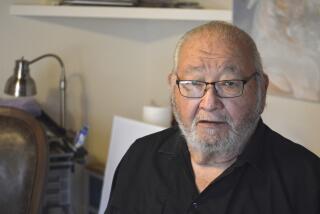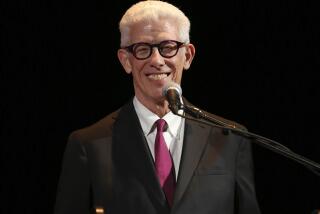John ‘Jack’ Leggett, mentor of emerging authors, dies at 97
John Leggett, a novelist, biographer and literary mentor whose ability to recognize emerging talent distinguished his 17-year tenure as head of the Iowa Writers’ Workshop, died Jan. 25 in Napa. He was 97.
Later the cofounder and director of the Napa Valley Writers’ Conference, Leggett had pneumonia, said his son, Timothy.
Leggett, who was known as Jack, oversaw the venerable Iowa program, the oldest of its kind in the country, from 1970 to 1987. The list of writers he admitted early in their careers includes T.C. Boyle, Jane Smiley, Stuart Dybek, Tracy Kidder, Allan Gurganus, Michael Cunningham, Denis Johnson and Ethan Canin.
“He was receptive to students, thoughtful, and patient. Why he ever gave me a chance to be in the workshop I will never know — I doubt that I was terribly promising — but he did,” Smiley, the Pulitzer Prize-winning author of “A Thousand Acres” said in an email Friday.
A New York book editor before moving to Iowa, Leggett was the third director of the program founded in 1936. Its eminent faculty has included Robert Lowell, Robert Penn Warren, John Cheever, Kurt Vonnegut, Philip Roth and John Irving.
The workshop, a two-year residency program that culminates in a master’s degree, admits only about one in 10 applicants. Despite its illustrious history, Leggett was acutely aware of the rarity of literary success even for those who are accepted.
“I get attached to the students that aren’t very successful and I suffer with them over their lives,” he told the Los Angeles Times in 1986 when the Iowa Writers’ Workshop turned 50.
He said he sympathized with writers who “almost always live with rejection and the feeling they’re impostors — that the only people accepted are the Irvings and Vonneguts.”
One of the qualities he looked for in workshop applicants was commitment to the idea that fine writing is important.
“They may be 20, 30 years out, and they may not be writing novels or poetry, but their lives are somehow centered upon it,” Leggett told the Associated Press in 1986.
“He once told me what he looked for was a sign that someone was just extraordinary at doing one thing,” said Lan Samantha Chang, who has directed the program since 2006. “Then that one thing would become their signature or part of their voice. He was extremely good at locating people’s strengths … and cultivating them.”
Leggett received mixed notices for his own novels, which include “Wilder Stone” (1960) and “Making Believe” (1986). His most successful book from a commercial standpoint was a high school textbook, “Elements of Literature” (1988).
The difficulties of the writing life were a consuming interest.
In “Ross and Tom: Two American Tragedies” (1974), he examined two writers of his generation, Ross Lockridge Jr. and Thomas Heggen, both of whom had experienced enormous success in the late 1940s with their first novels — Lockridge with “Raintree County” and Heggen with “Mister Roberts.” Both men committed suicide before they could produce another book. Jonathan Yardley, writing in the New York Times, called Leggett’s study “a fine example of literary and psychological investigation.”
A few decades later, Leggett probed the life of another writer whose successes came early: William Saroyan, the California dramatist who turned down the Pulitzer Prize for his 1939 play “The Time of Your Life” because he said it was no better than his earlier work.
Reviewers criticized “A Daring Young Man: A Biography of William Saroyan” (2002) as stilted, a problem arising from the Saroyan estate’s refusal to allow Leggett to quote from the playwright’s letters. But David Kipen, in a review for the San Francisco Chronicle, wrote that Leggett had “carved out a fascinating niche for himself as American letters’ premier anatomist of failure.”
“I think he always had an instinct for the underdog,” said Gurganus, the bestselling author of “Oldest Living Confederate Widow Tells All,” who attended the Iowa workshop in the early 1970s. “He was extremely handsome and looked like every author’s book photograph should look like. Yet he identified with people who had not had proper chances.”
He also was forthright about his own shortcomings. “Jack was always telling us what books he had turned down as an editor, including ‘The Bell Jar’ and ‘Catch-22,’” Gurganus said.
Leggett was born in New York on Nov. 11, 1917. His mother, the former Dorothy Mahar, died in the flu pandemic of 1918, and his absentee father, Bleecker Noel Leggett, left his upbringing to his grandmother.
Despite the difficulties of his early life, he made it to Yale, where he graduated with a degree in drama in 1942. He served in the Pacific with the U.S. Naval Reserve during World War II.
Leggett started writing stories during the war and collected “a fat swatch of rejection slips” before taking a job in 1950 at Houghton Mifflin, where he remained for a decade as an editor and publicity director. He later was an editor at Harper and Row. Among the authors he handled were Gay Talese and Larry McMurtry.
After retiring as director of the Iowa Writers’ Workshop, he moved to Napa and founded the Napa Valley Writers’ Conference in 1987 with poet Dave Evans. He recruited many Iowa graduates for the Napa faculty, including Cunningham, Smiley and Michelle Huneven.
His first marriage, to Mary Lee Fahnestock, ended in divorce. His survivors include his wife, Edwina Benington Leggett, three sons from his first marriage, four stepchildren and several grandchildren.
He was writing until he died, said Anne Matlack Evans, who directs the Napa Valley program. “He was writing novels that weren’t reaching the public but said, ‘That doesn’t matter to me,’” she recalled, “‘because writing literary fiction allows me to live within my imagination, and that is the greatest gift you can have.’”
Twitter: @ewooLATimes
More to Read
Start your day right
Sign up for Essential California for the L.A. Times biggest news, features and recommendations in your inbox six days a week.
You may occasionally receive promotional content from the Los Angeles Times.







